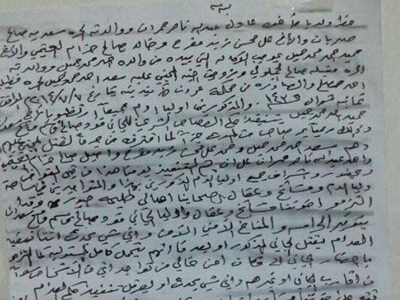

Extrajudicial Killing of Mr. Fouad Qassem Saleh, in Al-Madhiq Village, Haboor Dholaimah District, Amran Governorate
Sun - (28 Sep 2014)
The Universal Declaration of Human Rights states that:
“Everyone is entitled in full equality to a fair and public hearing by an independent and impartial tribunal, in the determination of his rights and obligations and of any criminal charge against him” (Art. 10), and “Everyone charged with a penal offence has the right to be presumed innocent until proved guilty according to law in a public trial at which he has had all the guarantees necessary for his defence” (Art. 11.1).
Under international human rights standards, people charged with crimes punishable by death are entitled to the strictest observance of all fair trial guarantees and to certain additional safeguards.
According to the Yemeni Constitution in force, Article (6) emphasizes on the State’s commitment to United Nations Charter, Universal Declaration of Human Rights, Charter of the League of Arab States, and the generally recognized rules of the international law. Article (47) provides that criminal responsibility is personal; no crime or punishment shall be administered except as based on a legal provision or law; a defendant is presumed innocent until proven guilty by decisive judgment of a court of law; and no law may be enacted which punishes retroactively any acts committed before its release.
In the Yemeni Constitution in force, Paragraph (b) of Article (48) also provides that no person may be arrested, searched or detained, except in case of flagrante delicto or by order stating the need to investigate and maintain security, issued by a judge or the Public Prosecution in accordance with the provisions of the law; and no person may be kept under observation or investigated except in accordance with the law. It is prohibited to imprison or detain any person in places that are not subject to the law regulating prisons, and it is forbidden to use torture and inhuman treatment at the time of arrest or during the period of detention or imprisonment. Everyone has the right to freedom from torture and other ill-treatment and to physical and mental integrity; no one may be subjected to torture or to other cruel, inhuman or degrading treatment or punishment. Coerced confession may not be used during investigation. Anyone whose freedom is restricted has the right to refrain from making any statement except in the presence of his lawyer.
Paragraph (c) of Article (48) states that “every person arrested on a temporary basis because of the suspicion of having committed a crime should be brought to the judiciary during the twenty-four hours from the date of his arrest at the most, and the judge or the Public Prosecutor should notify him of the reasons for the arrest and interrogation and enable him to make his defense and objections, and an order for prolongation or termination of detention must be immediately issued containing conducive reason(s). Under no circumstances may the Public Prosecutor continue to keep a person in custody for more than seven days except by judicial order, and the law specifies the maximum period of remand.
Paragraph (d) provides that “when a person is arrested for any reason, the nominee chosen by the arrested person should be immediately notified upon the issuance of each remand warrant, and if the arrested person cannot choose someone, notification must be made to his relatives or to whom it may concern.”
Paragraph (e) emphasizes that: “The law specifies the punishment of anyone who violates the provisions of any paragraph of this article, and also identifies the appropriate compensation for the damages that the person may suffer as a result of the violation. Physical or psychological torture upon arrest, detention or imprisonment shall be deemed a criminal offence that is not subject to any statute of limitations, and anyone who exercises, orders or is involved in it shall be punished.”
Article (49) asserts that “the right to defend oneself in person or by agency is guaranteed in all stages of the investigation and lawsuit and before all courts in accordance with the provisions of the law, and the state shall ensure judicial aid for those unable to obtain it in accordance with the law.”
Article (50) provides that “punishments may not be executed by illegal means and shall be regulated by law.”
Based on the above, and after a search about the incident, it has been found that what happened to Mr. Fouad Saleh Qasim, who was executed by firing on Tuesday evening, August 5, 2014, in Al-Madhiq Village, Haboor Dholaimah District, Amran Governorate, is a serious felony and flagrant violation of the Constitution, the law and international covenants on human rights.
The execution of a citizen/defendant without a final and decisive court verdict is more or less a denial of all his basic rights, mainly the right to a fair trial in a normal court of various degrees of litigation, and is a heinous crime the responsibility for which is borne by all those involved in the crime in any level.
Ansar Allah Group bears the responsibility of doing the arrest of the accused, of not handing him over to judicial bodies, and of complicity in the crime that took place in the area under their effective control.
This is a report to the Attorney General to initiate an investigation into the incident, accompanied by documents containing the names of those involved in this crime.
By/ Mwatana Organization for Human Rights